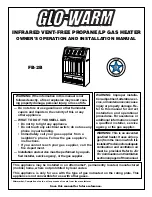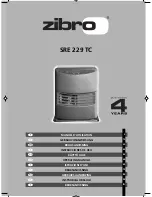
Instructions for use and maintenance
11
EN
English
The connecting of the conductors of the supply cord of the
appliance has to be carried out as follows:
•
conductor with brown insulation – to the phase
conductor of the electrical wiring (L)
•
conductor with blue insulation- to the neutral
conductor of the wiring (N)
•
conductor with yellow-green insulation – to the safety
conductor of the wiring (
)
3.3.
Models without power supply cord
The appliance has to be connected to a separate electricity
circuit of the stationary electrical wiring. The circuit has to
be supplied with a safety fuse 16A. Copper single core (rigid
– non stranded) conductor shall be used for the connection
– cable 3 x 1.5 mm2 for power 2000 W.
The electrical circuit supplying the appliance must have an
in-built device ensuring the splitting of all terminal poles
under conditions of super-voltage of category III.
In order to fix the power cable to the water heater, it is
necessary to remove the plastic cover
(fig.5)
. The power
leads connections must be in accordance with the terminal
markings of the thermal circuit breaker:
•
the phase cable must be connected to the A1 (11)
terminal
•
the neutral, to the B1 (21) terminal
•
and the protection terminal, obligatory to the marked
screwed joint
.
The power supply cord can be fixed to the plastic control
panel with a cable stop. After the installation, the plastic
cover must be replaced in its original position!
Explanations to
Fig.3
:
T1 – thermal regulator, T2 – thermal circuit breaker, IL1 –
light indicator, R – heater
V.
OPERATING THE DEVICE
Before initial start of the device, please make sure that the
water heater has been correctly connected to the electrical
network and that it is filled up with water.
Switching on the water heater is done through the device
incorporated in the installation, which is described in sub-
item 3.2 of paragraph V, or by inserting the plug into an
electrical socket (for models with cord with a plug).
Clarification to
Fig.6
:
Operation modes:
1.
Position (
) anti-freezing mode
WARNING: The electrical power supply of the device
should be switched on. The safety valve and the pipe
connecting it to the device must be secured against freezing.
2.
Position (
) maximum temperature
3.
Position (
) at this mode the water temperature
reaches about 60°С. In this way heat losses are reduced.
4.
Light indicator – at heating mode it is lit in red, and it
is lit in blue when the water has been heated up and the
thermostat has switched off.
5.
Regulator knob – for temperature setting
Water heaters with electrical-mechanical POP-UP
operation:
1.
Push the knob to pop-up
Fig. 7а
.
2.
Set the temperature of the water heater
Fig. 7b
This
setting allows for gradual temperature adjustment.
3.
Push the knob to retract
Fig. 7c
WARNING! Once a month set the knob to the
position ‘maximum temperature’ for a period of 24
hours (unless the device is constantly operated in this mode).
Thus you will ensure better hygiene of the heated water.
VI.
RUST PROTECTION MAGNESIUM ANODE
The magnesium anode protects the water tank's inner
surface from corrosion. The anode element is an element
undergoing wear and tear and is subject to periodic
replacement. This is cost for the user.
In view of the long-term and accident free use of your water
heater, the manufacturer recommends periodic inspections
of the magnesium anode's condition by a qualified
technician and replacement whenever required, and this
could be performed during the appliance's technical
preventive maintenance.
For replacements, please contact the authorized service
stations!
VII.
PERIODIC MAINTENANCE
Under normal use of the heater, under the influence of high
temperature, lime scale /the so-called lime scale layer/ is
deposited upon the heating element’s surface. This worsens
the heat exchange between the heating element and water.
The heating element’s surface temperature increases along
/of boiling water/. The thermoregulator begins to switch
on and off more frequently. A ‘’deceptive” activation of
the thermal protection is possible. Due to these facts, the
manufacturer recommends preventive maintenance of
your water heater every two years by an authorized service
center or service base. This protective maintenance must
include cleaning and inspection of the anode protector (for
water heaters with glass-ceramic coating), which shall be
replace with a new one if need arises.
In order to clean the appliances use a damp cloth. Do not
clean with abrasive or solvent content detergents. Do not
pour water over the appliance.
The manufacturer does not bare the responsibility
for all consequences caused by not obeying the
instructions, given hereby.
Environmental protection instructions.
Old electric appliances contain prescious
materials and must not be disposed with
the domestic waste! Please make your
active contribution to the protection of the
environment and dispose of the appliance
in the stations organized for the purpose (if
available).
Summary of Contents for GCA 1015 L52 RC
Page 3: ...3 BG MPa 0 1 MPa 3 4 5 6 7 0 1 2 3 7 4a 1 2 3 1 2 3 III 4 5 TESY...
Page 12: ...12 RU I 1 2 3 EN 60335 1 EN 60335 2 21 4 8 8 a 5 6 1 2 3 4 C 4 min 4 mm 1 6 0 6 Mpa 2...
Page 13: ...13 RU EN 1487 EN 1489 EN 1487 0 7 MPa 0 1 MPa 3 4 5 6 7 0 1 2 3 7 4 1 2 3 1 2 3 III 4 5 TESY...
Page 67: ...67 UA 0 1 MPa 3 4 5 i i 6 7 0 1 2 3 7 4 1 2 3 1 2 3 III 4 5 TESY...
Page 92: ...92 GR 3 4 5 6 7 0c 1 2 3 7 4 1 2 3 1 2 3 III 4 5 TESY...
Page 93: ...93 GR II 1 V 2 3 4 5 6 GC 7 I 8 9 40 C V40 10 11 12 III 1 G1 2 2 3 IV 1 4 mm 4 mm 96 114 2 2 C...
Page 94: ...94 GR 2 EN 1487 EN 1489 EN 1487 0 7 MPa 0 1 MPa 10 1 2 3 7 4 1 2 3 3 3 3 1 3 2...
Page 97: ...97 MK 0 7 MPa 0 1 MPa 3 4 5 6 7 0 C 1 2 3 7 4 1 2 3 1 2 3 16 III 4 5 TESY...
Page 117: ...117 AR 3 4 5 6 0 7 1 2 3 4 5 TESY...
Page 118: ...118 AR II V 1 2 3 4 5 SS GC 6 EV IV 1 G G 2 3 V 1 4 4 114 96 2 2 4 4b 3 2 1...
Page 120: ...120 AR 3 T2 R S T1 KL F IL1 VI 1 3 2 V 6 1 2 3 60 4 5 POP UP 7A 1 7 2 7C 3 24 VII IX...
Page 122: ...2A 2B 2C Floor instalacion GCU 1515 L52 GCU 1520 L52 GCU 1015 L52 GCU 1020 L52...
Page 123: ...3 4 5 6 7...












































